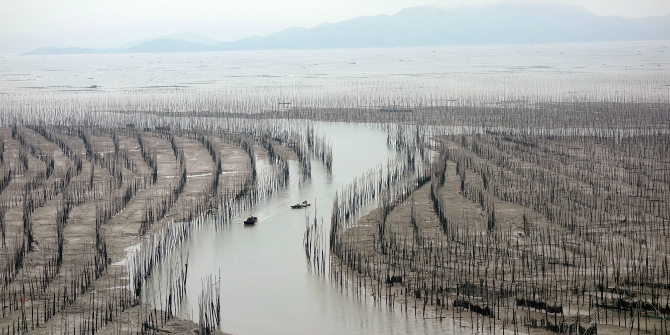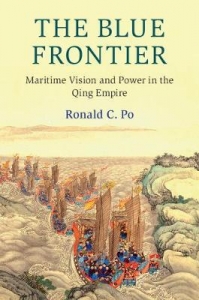In The Blue Frontier: Maritime Vision and Power in the Qing Empire, Ronald C. Po challenges the notion that the Qing dynasty neglected its oceanic boundaries, instead showing how it enacted comprehensive maritime policies across the long eighteenth century. The book’s project of historicising the production and projection of Chinese coastal territoriality is a valuable one, finds Tom Marling.
If you are interested in this book, The Blue Frontier is being launched at LSE on Thursday 22 November 2018. More information on how to attend can be found here.
The Blue Frontier: Maritime Vision and Power in the Qing Empire. Ronald C. Po. Cambridge University Press. 2018.
In the ‘great evacuation’ of 1661, China’s Qing Dynasty (1636-1912) effected a unilateral ban on the sea itself. Fearing an uprising originating in Taiwan and making land in south China, the teenage Kangxi Emperor forcibly relocated every person of the littoral populations of Guangdong, Fujian, Zhejiang, Jiangsu and Shandong provinces inland. The penalty for returning to the water was death. In what are today some of the most heavily populated tracts of land in the world – including the sites of modern-day Hong Kong, Shenzhen, Zhuhai and Xiamen – no civilian would set foot and no vessel would set out to sea.
The Blue Frontier: Maritime Vision and Power in the Qing Empire by Ronald Po presents a revisionist take on the traditional narrative of Qing maritime luddism, one which suggests that the great evacuation would best be understood as the final paroxysm of a worldview turning itself inside-out. Recalling Joseph Conrad’s disdainful depiction of French colonialism in Africa as constituted solely of ‘soldiers […] and customhouse clerks [… and] more soldiers to take care of the customhouse clerks’, Po finds that the Qing enacted a comprehensive maritime policy motivated by the kind of military-commercial alliance that is more commonly associated with the British instigation of the Opium Wars.
Chapter Three, ‘The Dragon Navy’, proposes that, unlike its Ming Dynasty counterpart commanded by the eunuch-adventurer Zheng He, the Qing navy hued closer to the modern role of a coastguard. Building on a lucid demonstration of the Qing state’s growing territorial assertiveness toward its oceanic boundaries, Po finds that the reconstructed navy was typically tasked with projecting its power within sight of the Chinese landmass, thereby transforming that narrow strip of commercially-viable ‘sea space’ into territory. Curiously bureaucratic as far as a war cry goes, the Qing naval slogan of ‘protect commerce and eliminate pirates’ indicates the extent to which, not unlike the contemporary war on drugs, military power was directed not against the forces of other nations, but against an unsanctioned (i.e. untaxed) commerce (piracy) that was undermining the smooth operations of sanctioned commerce.
 Image Credit: Fujian, China (yuen yan CC BY SA 2.0)
Image Credit: Fujian, China (yuen yan CC BY SA 2.0)
Some of the most interesting revelations in The Blue Frontier relate to previously unrecognised registers of regional and ethnic tensions in the Qing state. The initial impetus for the great evacuation had been the dubious loyalties of the southern Chinese populations toward the ethnically-other Manchus in power. By the following century, however, the Qing was forced to turn to this population to implement its maritime policy, in the process admitting that not only was it reliant on the southern seafaring economy for taxation income, but also upon that population’s extensive maritime knowledge to create and manage the navy to protect this economy.
Distrust of the southern Chinese remained endemic, however. The state routinely worried itself over the possibility that seafaring merchants would return from their sojourns in south-east Asia as enemy agents. This suspicion perhaps explains why enthusiasm for the project of developing a naval presence in the South China Sea waxed and waned. It was also not unjustified. The ‘dragon navy’ was constructed to protect the region’s merchants from piracy, merchants who, as it turned out, were also the region’s pirates in fallow times. Pirates would typically surrender bloodlessly, and would in turn frequently be recruited into the navy. Far from the northern seat of power, the state found that it was in effect paying to end piracy as much as eradicate it. The situation was similarly problematic when it came to the southern control over customs. The southern city of Canton (better known today as Guangzhou), which handled the vast majority of trade with Western nations, faced chronic problems with corruption, even as local officials strenuously argued against any diminution of its monopoly.
As a historian, Po is little prone to speculation, and his account, though fastidious, culminates inconclusively. Qing maritime policy vacillated frequently, and Po is ultimately only able to state, somewhat weakly, that ‘the Qing did not ignore its maritime frontier’. Absent a more definitive resolution, The Blue Frontier turns to identifying a deeper current of ‘maritime consciousness’ beneath the erratic swells and troughs of maritime policy. Like the recourse to the theory of ‘the production of space’ in the book’s opening chapter, consciousness fits awkwardly with Po’s tendencies as a historian. This is no more evident than in the final chapter, ‘Writing the Waves’, which deals with the works of three eighteenth-century authors. While the move away from practical officialdom and toward literary conceptualisation should present an opportunity for greater engagement with social history, discussion rarely strays from semantics, and seems far from touching on something as lofty as collective consciousness. Readers interested in other attempts at this consciousness-led approach might consider turning to China on the Sea: How the Maritime World Shaped Modern China (Brill, 2011) by Zheng Yangwen (also author of the excellent The Social Life of Opium in China).
Nonetheless, coming at a time in which Chinese and American ships are drawing close to collision in the South China Sea, Po’s overall project of historicising the production and projection of Chinese coastal territoriality is a valuable one. Thought-provoking presentiments of contemporary maritime policy abound in Po’s account, not least of which being the Qing’s apparent predilection for ‘annexing offshore islands, shoals and sandbars’.
Although it was Emperor Kangxi who inaugurated the high Qing, the era is most closely associated with the 60-year reign of his nephew, Qianlong. The comparison between Qianlong and Xi Jinping has been made before, and The Blue Frontier offers plenty of grist to the mill. Both found themselves mired in a bilateral borderland quagmire, simultaneously managing restive populations to the western extents of China and asserting authority along the oceanic frontiers to the east. Like Xi, Qianlong inherited the fruits of his predecessors’ opening to the outside world, and was tasked with the delicate task of projecting this newfound wealth as power. Whether Xi’s reign, like Qianlong’s, will eventually be viewed as little more than a ‘glorious façade’ looks set to hinge in part on projects like the Belt and Road Initiative succeeding where Qianlong could not – in creating a China that dictates relations with the outside world, rather than reacting to them.
Tom Marling has a PhD in History from Hong Kong Baptist University. His research interests include late-Qing tabloid fiction and the urban environment of Shanghai, and the history of pre-CCP organised labour in south China. He is one of the co-editors of Collected Essays of To the Seas and Beyond: An International Conference on the Maritime Silk Road (Hong Kong Museum of History and Hong Kong Baptist University Department of History, 2018).
Note: This review gives the views of the author, and not the position of the LSE Review of Books blog, or of the London School of Economic
 Find this book:
Find this book: 




 Visit our sister blog: the LSE British Politics and Policy Blog
Visit our sister blog: the LSE British Politics and Policy Blog 